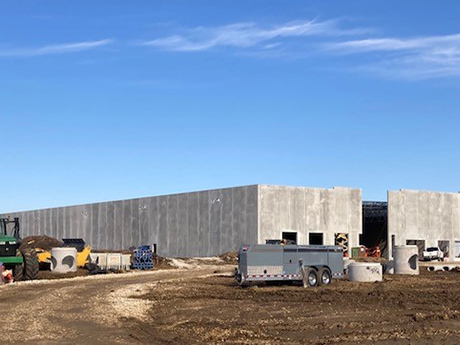By Chris Beason, NAI Ruhl Commercial Co.
As we move through 2025, the commercial real estate market in the Quad Cities region continues to adjust to tighter capital markets, rising costs and evolving consumer and business preferences. The bi-state region of the Quad Cities includes Moline, East Moline and Rock Island, Illinois; and Davenport and Bettendorf, Iowa, as the main core cities. The Quad Cities is the largest metro area between St. Louis and Minneapolis on the Mississippi River.
When you look at the fundamentals like industrial absorption, land sales and retail demand, the Quad Cities continues to outperform expectations. The level of investment we’re seeing from both global tech companies and regional developers shows long-term confidence in the strength and potential of our market.

Pivotal year for industrial
The Quad Cities market mirrored the national trends with increased development of industrial buildings and rising rental rates. While the new industrial development we have seen locally over the past three years is to be celebrated, there is still a shortage of smaller 10,000- to 50,000-square-foot buildings. This is especially true for companies that desire to purchase real estate. There is significantly more inventory for lease of smaller product available than available for sale. Demand in this size range continues to outpace supply, especially among local and regional owner-users.
While fundamentals remain solid, 2025 looks to be a transitional year with activity leveling off to more stable levels. Despite a softening in velocity, lease rates and sale prices are expected to hold due to construction costs and limited new supply.
Amazon is deepening its presence in Davenport with a 114,000-square-foot expansion to its current robotics fulfillment center. Another significant industrial development in our market was Meta’s purchase of 328 acres of land adjacent to the Eastern Iowa Industrial Center in Davenport for a new $800 million data center. When completed, this will be the largest economic development project in the history of the Quad Cities. Iowa is home to more than a dozen data centers owned by tech giants like Meta, Google, Microsoft and more.
Land opportunities
Development-ready land in the Iowa Quad Cities continues to draw strong demand, fueled by steady commercial and residential expansion. Growth around the TBK Bank Sports Complex in Bettendorf remains a focal point, with multiple new projects completed and others underway. Significant farmland sales in Northwest Davenport and Eldridge are also drawing attention from investors anticipating future land use changes.
As development ground trades hands, many sellers are reinvesting into transitional land and high-quality farms. This cycle is creating a ripple effect, helping to sustain land values across the region despite rising interest rates and tighter capital markets.
Premium tillable farms remain in high demand across Iowa. While productivity and soil quality are still key, location and long-term development potential are playing a larger role in driving price per acre.
Local municipalities are supporting this momentum with forward-looking infrastructure plans. Rock Island is exploring growth in its southwest quadrant, while Bettendorf and Davenport continue to expand north of Interstate 80. Public-private cost sharing is becoming more common, and out-of-market site selectors are showing increased interest. Understanding where infrastructure is headed will be essential for identifying future land investment opportunities.
Retail is transforming
The local retail sector has continued to attract investment and activity, bolstered by a mix of national tenants and local businesses. Several new establishments at the TBK Bank Sports Complex area in Bettendorf have reinforced the market’s vitality, and developments near Walmart-anchored centers signal continued strategic investment, even as rising operational costs present ongoing challenges.
The Quad Cities retail sector is transforming, shaped by a combination of consumer preferences, economic factors and real estate trends. Updating older retail centers to reflect modern consumer expectations and contemporary design elements will attract new tenants and shoppers.
Looking ahead, the Quad Cities retail market is expected to maintain a stable trajectory period. Lease rates and demand should remain steady, mirroring broader national trends. Through strategic investment and forward-thinking development initiatives, the Quad Cities retail sector remains well positioned.
Office definitely isn’t over
A review of transaction activity over the past year underscores the resilience of the local office sector. Professional service firms, healthcare providers and financial institutions have been at the forefront, actively leasing and purchasing office properties.
While speculative development will remain limited, steady leasing activity is expected to continue, particularly in Class A properties that offer turnkey solutions and modern amenities. Businesses are prioritizing high-quality office space over sheer square footage.
A key challenge for the downtown office market continues to be the shifting dynamics of post-pandemic office occupancy, which has been more concentrated in the suburban areas of the Quad Cities. Companies are increasingly prioritizing these locations due to factors such as parking convenience, accessibility and proximity to amenities.
While work habits have undoubtedly evolved, office space remains a fundamental component of business operations in the Quad Cities.
Looking ahead, the Quad Cities commercial real estate market is expected to maintain stable growth, with careful attention to evolving consumer preferences, operational efficiencies and outside policy fluctuations that affect the cost of doing business. Strategic development initiatives and adaptability will be key drivers of sustained market health.
The Quad Cities market is positioned for continued success in the face of economic uncertainty, guided by strategic investment, adaptability and a forward-looking development approach.
Chris Beason is president of NAI Ruhl Commercial Co. This article originally appeared in the August 2025 issue of Heartland Real Estate Business magazine.


